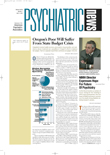Noting that geriatric psychiatry is not a field with which he is very familiar, National Institute of Mental Health (NIMH) Director Thomas Insel, M.D., challenged the American Association for Geriatric Psychiatry at its recent annual meeting to step up and take the lead on critical issues defining mental health care for the future.
Insel told those attending the meeting’s presidential plenary session (
see story above), “I think this is an exciting time to be doing what all of you are doing—trying to push the frontier of research, treatment, and services for elderly persons.”
The Decade of the Brain, Insel said, accomplished many things, not the least of which was giving psychiatrists new tools like imaging techniques and genomics “that we can now use to really understand the basic processes of how the brain ages.” The field of geriatric psychiatry should leap at the opportunity to use those tools to further its knowledge base, he said.
“I do have a few special hopes for this field,” Insel began, “the most obvious of which is that those tools will be translated into treatments, a great goal that I think can happen fairly quickly.”
Insel hopes that by studying the sort of “natural experiment that aging represents, we may be able to learn something about the pathophysiology of depression, or schizophrenia, or anxiety disorders that has not been obvious to us by looking at persons at other points within the life cycle.”
The field, he continued, stands before an “important window,” with potentially “unique insights that may be important not only for our elder patients, but for all of our patients at the end of the day.”
Insel noted that his return to NIMH after eight years of basic neuroscience work at Emory University had him feeling like Rip Van Winkle, since so much had changed and so much more is now known about basic mental health issues.
Since returning to psychiatry, Insel said, he has noted a slow movement toward a merger of psychiatry and neurology that appears most prominent in the geriatric field. AAGP and the study of geriatric psychiatry, Insel continued, “might represent one of the best ways to accomplish that [coming together].” The evolving neurobiological view of the aging brain already includes both the cognitive and behavioral changes that both specialties treat, Insel noted.
The field today has effective treatments for many of the neuropsychiatric disorders affecting a geriatric population, “and yet we don’t use them,” Insel lamented.
“I think that one of the places [geriatric psychiatry] is beginning to move, and this society is having some leadership role in, is the issue of affecting the way primary care physicians and others screen, diagnose, and treat mental illnesses. When these illnesses are diagnosed by primary care physicians, they are rarely treated. When they are treated, they are rarely treated well,” Insel said. “Those things that we take for granted because of the skills inherent in our core competency do not necessarily translate into the primary care setting.”
There is a great challenge in improving mental health care in primary care settings, Insel said, a challenge that cannot and must not be ignored.
The challenges ahead are made all the more difficult in light of impending budget cuts. NIMH, with an 80 percent increase in its budget since 1998, will see only an 8.4 percent increase for Fiscal 2003 and, Insel said, “if we actually get 3 percent out of 2004 when all is said and done, I will be surprised and overjoyed.”
One solution to shrinking budgets is to set very clear priorities, something Insel said AAGP clearly is good at doing. “The research that can guarantee that we continue to move from the bench to the bedside,” he said, “is a goal that we have to keep our eyes on.”
Another solution is to make use of inter-institute funding, partnering with the National Institute on Aging and the National Institute of Neurological Disorders and Stroke to “co-fund” projects that benefit the whole of neuroscience and aging research.
“AAGP has come so far in such a short time,” Insel concluded. “You have had great leadership, and you are going to have a great leader this year. I always know when a group has great leadership because its members keep bothering me,” he said to significant laughter.
“It’s a very good sign that you are making things happen, and you will continue to do so by pounding on me and the directors of NIA [National Institute on Aging] and NINDS [National Institute of Neurological Disorders and Stroke],” he said. “You should be proud that you are doing so.” ▪
